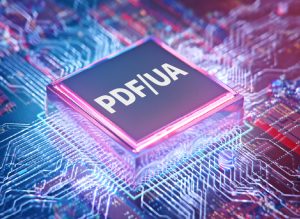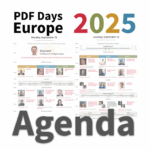A new meeting place for developers working with accessibility and PDF

In addition to his expertise with the CommonLook suite of tools for testing, creating and remediating PDFs, he is also well versed in accessibility standards including Section 508 (including the recent “refresh”), Health and Human Services (HHS), WCAG 2.0, WCAG 2.1, and PDF/UA. Paul is a member of the IAAP … Read more


Mission
 As previously announced the new PDF/UA Processor LWG’s mission is to establish principles and a framework, and then develop requirements for PDF/UA processors and assistive technology (AT).
As previously announced the new PDF/UA Processor LWG’s mission is to establish principles and a framework, and then develop requirements for PDF/UA processors and assistive technology (AT).
Objective
To ensure end users can obtain accurate, consistent results when interacting with digital documents regardless of software or platform, the PDF/UA Processor LWG will draft a technical specification for processing PDF/UA files.
The business case
Who will benefit from a specification for processing PDF/UA files?
- PDF creators: More capable viewing software will improve demand for PDF/UA creation.
- PDF viewers: Support for PDF/UA (and tagged PDF in general) will be easier to add and maintain with confidence, even for developers without specific expertise in supporting accessibility.
- Incidental PDF processors: Awareness of PDF/UA (and tagged PDF in general) will make it easier for developers who don’t intend to present the document (e.g., anti-virus or document management software) to nonetheless avoid damaging it.
- AT developers: A standardized API, for example, would make enabling PDF accessibility much less costly, increase the scope for user-specific features and options, and would greatly improve the end-user experience.
- Document authors: When content is presented as intended, authors’ content will be more accurately and consistently conveyed to all the document’s readers.
- Policy managers and regulators: With better software support for PDF/UA, policy creators, and regulators will be able to set clear procurement standards for their vendors.
- AT users: Those reading and/or interacting with content in PDF, using assistive technology, will enjoy a comprehensive, consistent experience.
Background
Since PDF 1.4 was published in 2000 the PDF format has included syntax to enable accessibility through the Tagged PDF feature (ISO 32000, 14.8).
PDF was introduced in 1993, and was designed for use with desktop application software. The first accessibility specification for PDF, PDF/UA, therefore focused on desktop applications. Today, PDF operates in a multi-platform world, but accessibility specifications have not kept up with current-generation software. It is now critical to define and achieve an equivalent experience for all end-users regardless of platform.
Meanwhile, commonly-used web technologies have also evolved, and now target delivery of consistent results across platforms and devices. This has been made possible, in part, due to the development and adoption of high-quality APIs that have allowed AT to work across platforms. The same, unfortunately, cannot be said of PDF. Today, there is no common accessibility API for processing tagged PDF. Even worse, some accessibility vendors use entirely implementation-specific approaches. Consequently, end-users employing various devices typically do not receive an equivalent or consistent experience, a cornerstone of accessibility.
Possible approaches
Past efforts in authoring processor and AT requirements have included a variety of approaches, all of which involved mapping tagged PDF to something consumable by AT.
Some possible approaches are outlined below, but others ideas are very welcome.
- Requirements for processing PDF/UA files for content delivery to APIs / AT
- Requirements for AT’s role and behaviors
- “An accessibility tree for PDF” - building on Adobe’s PD DOM, etc.
- Leverage the web accessibility tech (HTML DOM ++) defined by W3C
- A “UAAG for PDF”
- Mapping to your favorite accessibility API(s), such as platform standards
Other possibilities abound!
Who can participate?
We hope to involve a diverse group of experts, including developers whose focus is on accessibility. While developing the specification, the PDF/UA Processor LWG will welcome new ideas and provide a workplace for development of other industry-agreed outcomes (e.g., test files) aligned with our mission.
The LWG’s intended participants are:
- Developers providing support for accessibility needs, including remediation
- Developers working on PDF processors that interface with end users, including PDF viewers and web browsers
- Assistive Technology (AT) experts
Join the effort!
Joining the PDF/UA Processor LWG is straightforward. PDF Association members can simply join via the Member Area on pdfa.org.
Suitably qualified non-members wishing to participate may do so at no cost. Contact info@pdfa.org to tell us about your interest in PDF/UA processor requirements, and to request access.
Join us for our next meeting on August 31, 2022 at 12:05pm Eastern (18:05 CET).




